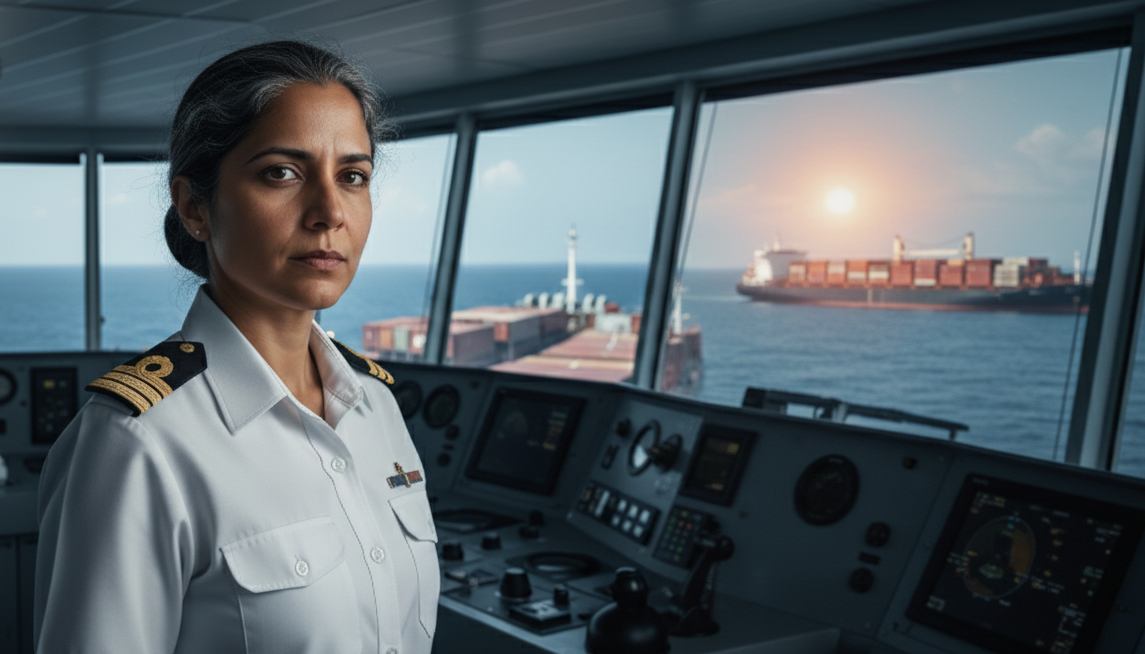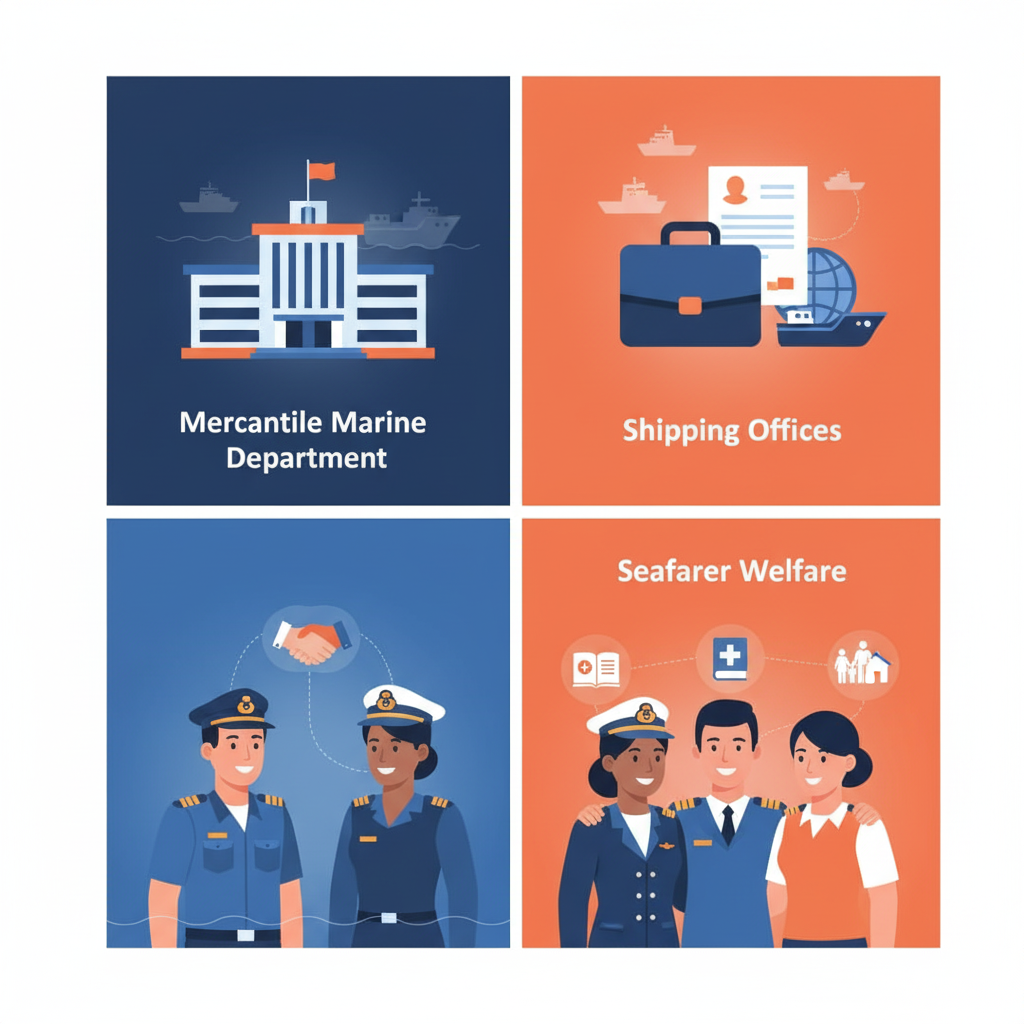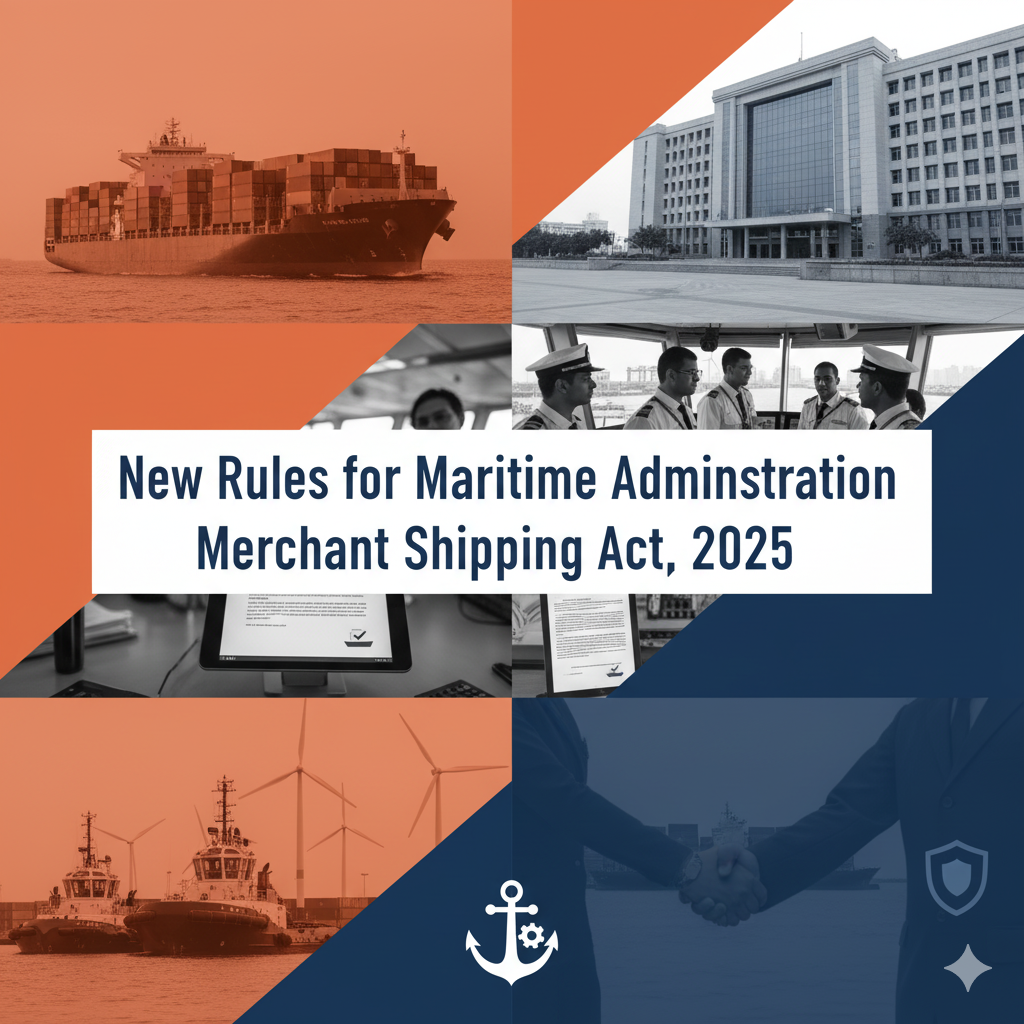
India’s maritime industry runs on a complex network of structures and departments that keep ships, seafarers, and ports functioning smoothly. The new MS Act 2025 lays down a new set of rules and systems for how the maritime administration functions. Sections 7 to 13 explore the said systems and defines who manages what, from the Director – General of Maritime Administration to surveyors, shipping masters, and the port security body. The sections ensure each and every ship is worthy and safe for the journey at sea. Before understanding the structure laid out for the maritime administration it’s important to understand the Preliminary of this act.
Understanding the role of Director – General of Maritime Administration.

This section is all about the powers and roles of Director – General (DG) of maritime Administration (DGMA). In this part we will dive deep into how they come into power, when they get to use their authority and what the functions of a said appointee would be.
- A DGMA generally would be appointed by the government through a notification.
- He/she once in office will have the opportunity to exercise certain roles and powers over the industry if approved by the central government along with the other officers specified in order. This is done in the hopes of delegating the work load for the central government.
- The director general is allowed to further delegate his powers to his subordinates, but only after acquiring the permission for it.
- The director general will have the control of supervision and much more over the specified officers listed in the next section of this blog.
Officers under the supervision of Director general.
There shall be the following officers to be appointed by the government who shall discharge the duties and functions under this Act, namely: —
(a) Additional Director-General;
(b) Deputy Director-General;
(c) Assistant Director-General;
(d) Surveyors, which shall include the following, namely:
(i) nautical advisor
(ii) chief surveyor
(iii) chief ship surveyor
(iv) principal officer
(v) deputy nautical advisor
(vi) deputy chief surveyor
(vii) deputy chief ship surveyor
(viii) nautical surveyor
(ix) engineer and ship surveyor
(x) ship surveyor
(xi) junior ship surveyor
(e) shipping master which shall include deputy or assistant shipping master.
(f) director which shall include deputy director or assistant director.
(g) senior radio surveyor.
(h) radio inspector.
(I) seafarer’s welfare officer.
(j) any other officer as may be notified by the Central Government.
These listed officers will be working under the DG appointed by the central government and also will decide and officially announce the salary, benefits, and service conditions of all maritime officers.
Along with this, the Merchant shipping act 2025 has also worked on establishing rules for the national shipping board and seafarer welfare board through sections 4,5 & 6.
Appointment of Surveyors under MS act 2025.
- The central government may, by notification appoint as many people as it may think fit to be surveyors for the purpose of this act:
- The government can also authorize private experts or organizations to act as surveyors under official rules.
- Can appoint radio experts to check all ship communication and radio equipment.
- The powers and functions of the senior radio surveyors and radio inspectors shall be prescribed in detailed rules.
Mercantile Marine Department & Shipping Offices and seafarer welfare.
MMD:
This section of the act is all about the Mercantile Marine Departments and the power of the central government over the establishment and operations of these said departments.
Meaning the central government has the power to set up and run these MMD’s at India’s main ports:
- Mumbai
- Kolkata
- Chennai
- Kochi
- Kandla.
It can also open up these departments in any other ports if necessary and this administrative move will ensure that the Merchant shipping act and its structures are being properly implemented successfully across the country. Along with this, the government will appoint a principal officer for each of these offices and he will be on top of the management hierarchy in these administrations. They can also do the same with smaller ports by issuing official notifications and also assign any suitable officer to be in charge of that office.

Shipping offices:
The central government can set up shipping offices at the key ports of India and any other ports if necessary, these offices are responsible for handling crew related matters, ship registrations, agreements, and seafarer welfare. The International Labour Organization (ILO) had done something similar for the welfare of the seafarers by adapting significant amendments under Maritime labor Convention, 2006-amendments, during its 110th session in 2022.
The government appointed staff for these offices will be as followed:
- A Shipping Master (the main officer in charge)
- Deputy/Assistant Shipping Masters to assist
- A Director (and assistants/deputies)
- Seafarer’s Welfare Officers to handle welfare, repatriation, and grievances of seafarers.
Section 12 empowers the establishment of shipping officers across Indian ports and even abroad, to manage seafarer welfare, documentation, and shipping administration, ensuring no port or seafarer is left unsupported. And to ensure the enrichment of the shipping industry, new maritime businesses are essential, if you are someone looking to start a maritime business, get your maritime technical consultancy for RPSL and startups today.
Body for Security of Vessels and Port Facilities
This section is all about the Central Government creating a specialized body responsible for maintaining maritime and port security in line with international standards.
In clause 1 of this section, it states that the government can create a dedicated security body through an official notification and the body will be responsible for protecting ships, ports, and related maritime infrastructure. The initial notification should specify the name of the body and the designated officer for it along with his roles – where he will be responsible for running and managing the body and will have the authority over decision making and administrative power.
The body’s main function is to regulate and monitor maritime security, this includes creating and enforcing rules about port and ship safety, etc. All its rules, structures and standards must be consistent with the International Ship and Port Facility Security (ISPS) Code, a global standard adopted under the Safety of Life at Sea (SOLAS) Convention. However, the act clearly lays out the main 4 duties this body should perform, the duties are to:
(a) provide regulatory framework for security of vessels and port facilities;
(b) ensure timely collection and exchange of security related information with regard to vessels and port facilities;
(c) coordinate with other agencies;
(d) any other functions as may be prescribed.
In conclusion this new act is set out to improve the shipping industry and seafarer safety, to add to this DGS alos set out a curricular for taking Strict Action Against Forged CDC Entries in Indian Maritime Sector.
FAQs
1. What is the main focus for maritime administration under the Merchant Shipping Act, 2025?
Sections 7 to 13 describe the structure of India’s maritime administration and the key roles under it. These sections define how officers are appointed, what their powers are, and how different departments manage shipping, safety, and security.
2. Who is the Director-General of Maritime Administration and what is their role?
The Director-General is appointed by the Central Government to oversee all maritime administrative functions. This person supervises officers, delegates powers, and ensures that the Act is implemented efficiently.
3. What is the purpose of the Mercantile Marine Department (MMD)?
The Mercantile Marine Department is established at major ports like Mumbai, Kolkata, Chennai, Kochi, and Kandla. Essentially, it enforces the technical and safety standards of ships operating under the Indian flag.
4. What are Shipping Offices and why are they important?
Shipping Offices are created at ports to manage the employment and welfare of seafarers. They appoint officers such as Shipping Masters, Directors, and Welfare Officers to handle crew documentation, contracts, and disputes. These offices ensure seafarers are protected and their rights are maintained.
5. What is an ISPS Code?
The ISPS Code, or International Ship and Port Facility Security Code, is a global framework developed by the International Maritime Organization (IMO) to enhance ship and port security. It was introduced after the 9/11 attacks to prevent terrorism, piracy, and other threats. The Merchant Shipping Act, 2025 ensures that India’s maritime security follows the ISPS Code standards.
6. How do these new rules improve maritime safety and efficiency in India?
These rules create a clear administrative system that covers everything from officer appointments to port security. They promote coordination among maritime departments, strengthen ship inspections and seafarer welfare, and align India with international maritime regulations. Overall, they help build a safer and more efficient shipping industry.

